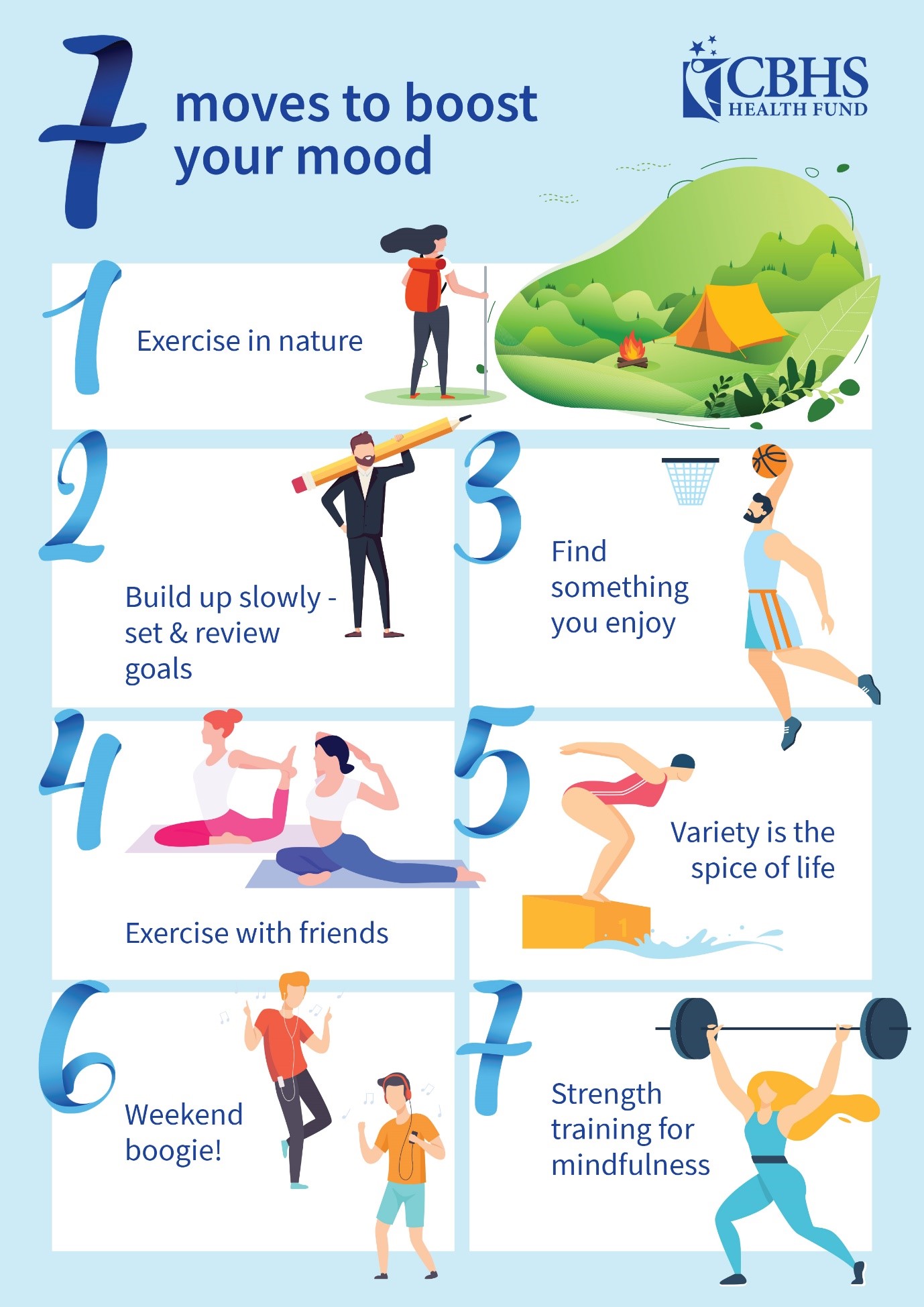We know that exercise can have amazing effects on mood, for a number of possible reasons. It’s a great way to get a mental boost for free, while improving your physical health and wellbeing too. Sometimes the hardest part is putting on your shoes and gear and getting out the door. But put it this way, when have you ever said, “I wish I never went for that walk!” afterwards.
Some studies have actually found that exercise can be as effective as medication for depression and anxiety… and without the negative side effects of the meds!
If you’re still not convinced, here are seven ways to try help shift a negative headspace.

Exercise in nature
Want even more happy hormones? Head outdoors. Research has shown that exercising in nature has greater benefits than exercising in a gym. Even walking outdoors surrounded by greenery, for as little as 5 minutes, can improve your mood. It’s called ‘green exercise’. Many people love to exercise with a view of the water, for extra calm and clarity.
Try leaving your desk at lunchtime and walking to the nearest park. You’ll boost your mood as you tuck into your sandwich. And guess what? It works virtually too. So, if you prefer to exercise in the gym, add sounds or images from nature and you’re more likely to reduce your stress levels.
Build up slowly – set and review goals
Start low and go slow. You’re more likely to succeed that way, and success makes you feel good. Check your fitness when you start. One simple method would be to time how long it takes to walk a kilometre.
Write down your goals. Training for a marathon? Losing weight? Trying to get fitter? Once you know your long-term goal, you can plan shorter-term goals to achieve it. Pin your goals to the fridge and tick them off as you go.
And don’t forget to monitor your progress. Seeing improvements will help keep you motivated.
Find something you enjoy
If gym’s not your thing, there are heaps of alternatives, from joining a community garden to learning a musical instrument. Yes, that’s right. Playing a guitar burns calories. Playing the drums consumes even more and skydiving burns the same number of calories as vacuuming the floor. Fishing burns as many calories as weightlifting! Check out more fun caloric comparisons.
The more you like doing something, the more you’ll do it and the better you’ll feel. Supercharge the benefits by finding an activity you can enjoy outdoors.
Exercise with friends
Buddy up you might get even more benefits. There are plenty of good reasons to exercise with a friend. You’re more likely to stay motivated, less likely to get bored and you might even work harder too. There’s nothing like a spot of friendly competition to keep you on your toes.
Even better, you can have a laugh while you’re exercising. Laughter can boost your immune system, lower your anxiety and release tension. And when you support each other, it makes reaching your goal that much easier.
Variety is the spice of life
Studies have shown that if you want to boost your mood, it really doesn’t matter which exercise routine you choose. Walk, swim, cycle, lift weights or throw yourself into any physical activity you love – all of them can give you a lift and reduce symptoms of depression.
But if you want to avoid getting bored it makes sense to mix it up. Adding variety to your routine will increase your enjoyment and help you stay motivated. And don’t overlook activities like yoga. Yin yoga combines the mental health benefits of meditation with the physical benefits of yoga.
Weekend boogie!
If you hit the dancefloor at least once a week you’ll improve your mental health, and it doesn’t matter how old you are. Similar results were found for teenagers and seniors, and in one study the benefits lasted up to eight months after classes finished. Not quite ready to strut your stuff in public? No problem. Select your favourite dance music at home and let it rip. Eight tracks should give you around 30 minutes of vigorous exercise.
Strength training for mindfulness
Weights could be the way to go if you want to lift your mood. Strength training can significantly reduce symptoms of anxiety and depression. Even if you don’t build muscle, resistance training can still boost your mental health. And you don’t need to own a set of barbells or take out a gym membership − work with what you’ve been given naturally, with these bodyweight exercises.